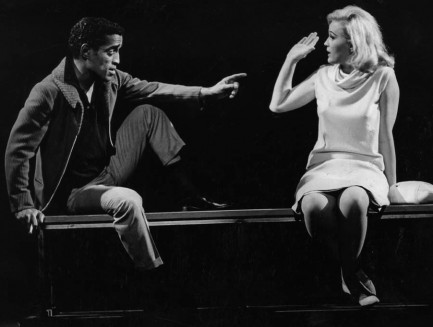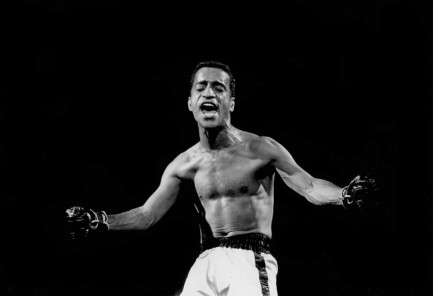 Money is always greener from a distance. 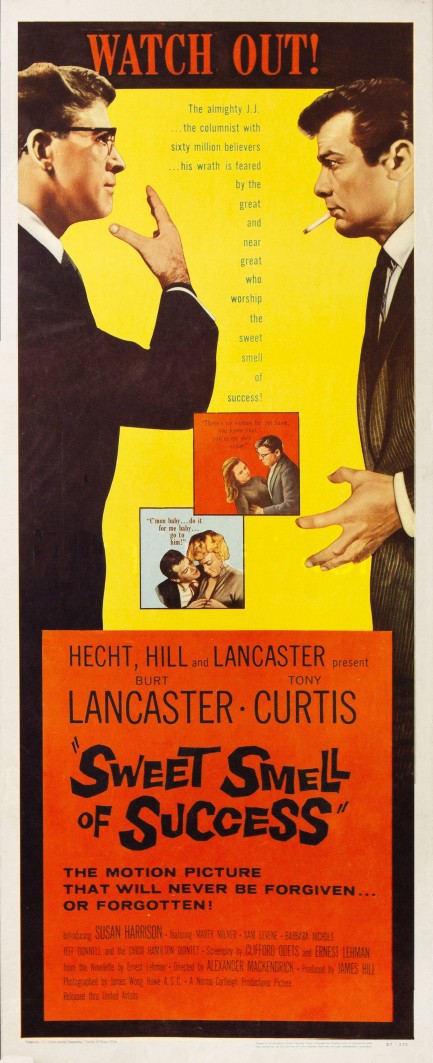
Sweet Smell of Success was a mandatory watch for us. It's considered by many to be a top film noir but we'd never seen it. Well, that's been rectified now, and what a good expenditure of time it was. Tony Curtis plays a New York City publicity agent whose business is falling apart because he's been blacklisted by the most important newspaper columnist in the country, played by Burt Lancaster. Why the rough treatment? Lancaster's sister is dating a jazz musician and he wants the relationship ended. He's trying to force Curtis to do the dirty work—smear the guy, frame him, whatever, just get him out of the picture. Curtis's desperation to climb to the top ranks of agents leads him to try breaking up the pair, but in film noir sleazy decisions have a way of pushing goals farther away rather than drawing them nearer.
Sweet Smell of Success, which had a special premiere in New York City in June 1957, and went into national release a week later, which was today, has a feel similar to another Big Apple drama—the excellent 2019 movie Uncut Gems. Both movies are very fast paced, even borderline chaotic, as desperate bottom-dwellers try to climb to the top of a dog-eat-dog industry while keeping one step ahead of karmic fate. Sweet Smell of Success is the better film largely thanks to Lancaster in one of the all-time heel roles. You'll want to punch his character J.J. Hunsecker—nice, right?—directly in the middle of his face. And you'll want to give Curtis a shaking fit to rattle his teeth. Anything to wake him up to the fact that in a cutthroat game, the most important thing isn't having a razor but lacking a conscience. Noir fans should push this one to the head of the queue. 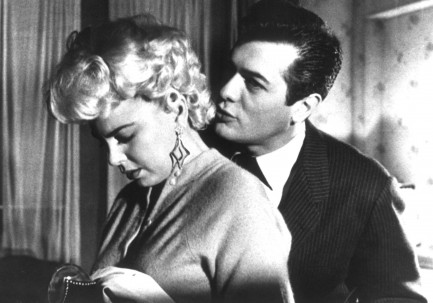 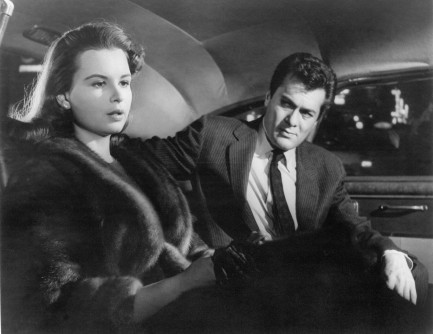 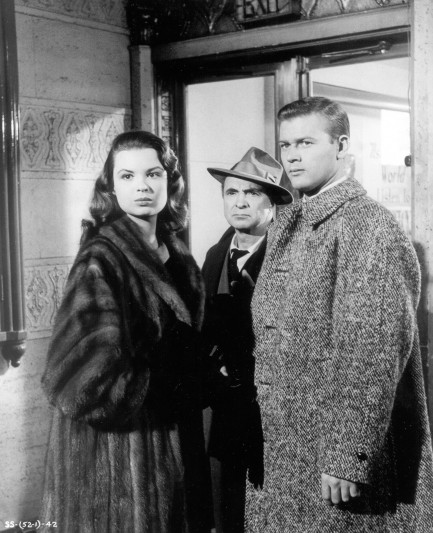 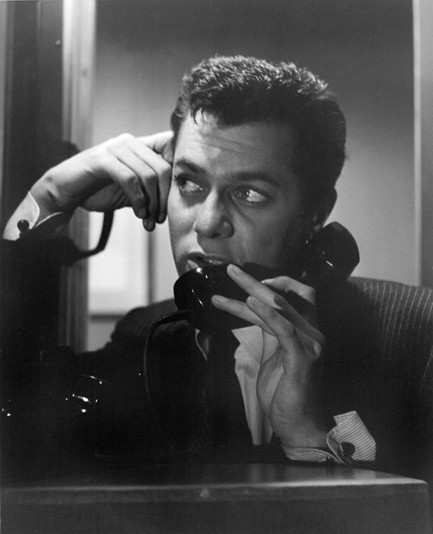 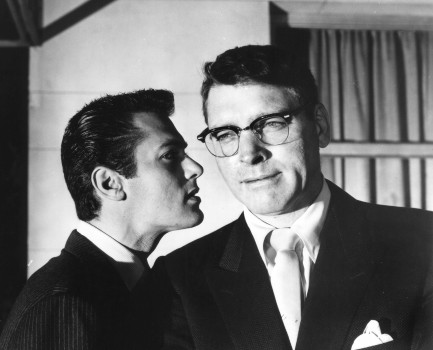 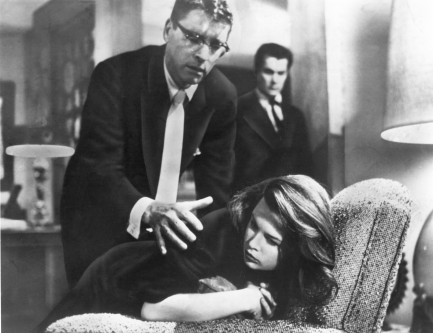 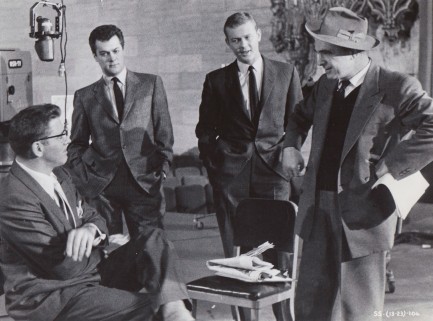 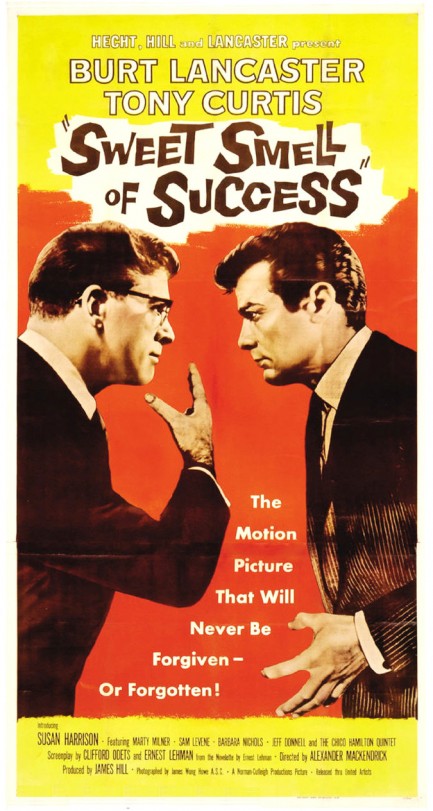
 The Big Knife could be sharper but its lessons about Hollywood ruthlessness resonate. 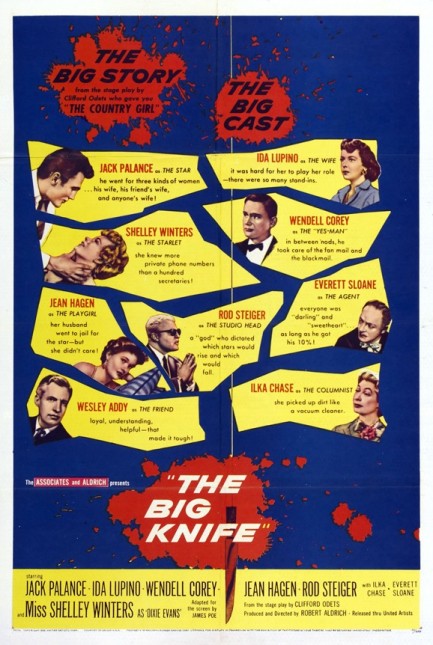
Above you see a poster for the 1955 drama The Big Knife, which, along with The Bad and the Beautiful, plays on tonight’s dark-side-of-Hollywood double bill at the Noir City Film Festival. Based on Clifford Odets’ play of the same name, The Big Knife tells the story of a star actor who wants to expand artistically, but is being tormented by his studio boss to ink a new deal locking him into more of the unfulfilling schlock that put him on the map. The studio has leverage because it helped the actor—played by Jack Palance—hide his role in causing a fatal car accident years ago. The studio boss—Rod Stieger, shamelessly hamming up the place (see photo below)—will stop at nothing, including blackmail, to get the contract signed. The stage-based origins of The Big Knife are clear, as the action rarely leaves one room and the dialogue is at times florid, but the question of whether Palance has the constitution to stand up to Stieger’s abuse offers some tension, and Ida Lupino as Palance’s wife helps elevate the exercise. Above average, we’d call this one, but we think festivalgoers will like The Bad and the Beautiful a lot better. 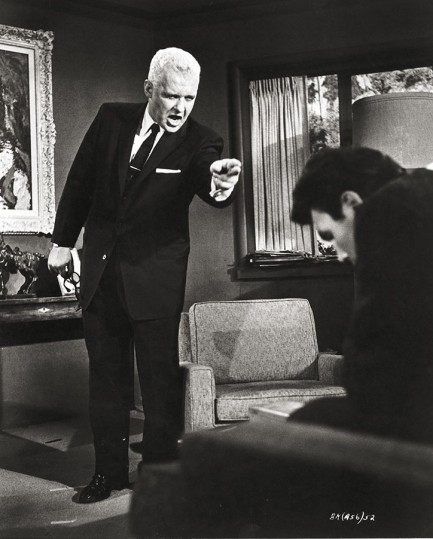
 Who can take a tragedy and make it a success? The Candyman can. 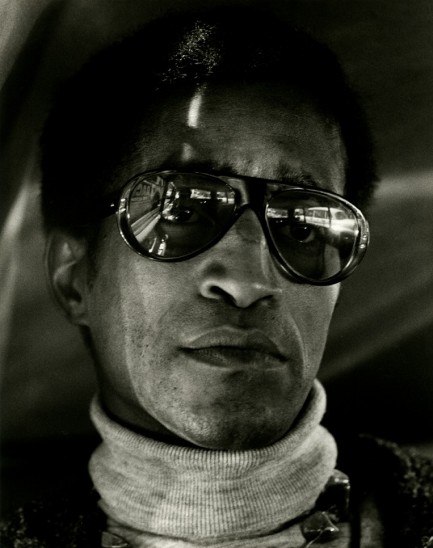
A world-weary Sammy Davis, Jr. appears here in a photo shot by Peter Basch in the back of a Chicago limousine. Davis was about to go to New York to star on Broadway in Clifford Odets and William Gibson’s Golden Boy, a musical involving a boxer’s turbulent career, doomed interracial romance, and eventual suicide. Not exactly an uplifting night out, yet the show ran for 569 performances and the cast album cracked the Top 40. That’s called star power, and Davis, who was already huge in Hollywood and the music industry, had it to spare. The photo dates from 1964.
|
 |

The headlines that mattered yesteryear.
1933—The Gestapo Is Formed
The Geheime Staatspolizei, aka Gestapo, the official secret police force of Nazi Germany, is established. It begins under the administration of SS leader Heinrich Himmler in his position as Chief of German Police, but by 1939 is administered by the Reichssicherheitshauptamt, or Reich Main Security Office, and is a feared entity in every corner of Germany and beyond. 1937—Guernica Is Bombed
In Spain during the Spanish Civil War, the Basque town of Guernica is bombed by the German Luftwaffe, resulting in widespread destruction and casualties. The Basque government reports 1,654 people killed, while later research suggests far fewer deaths, but regardless, Guernica is viewed as an example of terror bombing and other countries learn that Nazi Germany is committed to that tactic. The bombing also becomes inspiration for Pablo Picasso, resulting in a protest painting that is not only his most famous work, but one the most important pieces of art ever produced. 1939—Batman Debuts
In Detective Comics #27, DC Comics publishes its second major superhero, Batman, who becomes one of the most popular comic book characters of all time, and then a popular camp television series starring Adam West, and lastly a multi-million dollar movie franchise starring Michael Keaton, then George Clooney, and finally Christian Bale. 1953—Crick and Watson Publish DNA Results
British scientists James D Watson and Francis Crick publish an article detailing their discovery of the existence and structure of deoxyribonucleic acid, or DNA, in Nature magazine. Their findings answer one of the oldest and most fundamental questions of biology, that of how living things reproduce themselves. 1967—First Space Program Casualty Occurs
Soviet cosmonaut Vladimir Komarov dies in Soyuz 1 when, during re-entry into Earth's atmosphere after more than ten successful orbits, the capsule's main parachute fails to deploy properly, and the backup chute becomes entangled in the first. The capsule's descent is slowed, but it still hits the ground at about 90 mph, at which point it bursts into flames. Komarov is the first human to die during a space mission.
|

|
|

It's easy. We have an uploader that makes it a snap. Use it to submit your art, text, header, and subhead. Your post can be funny, serious, or anything in between, as long as it's vintage pulp. You'll get a byline and experience the fleeting pride of free authorship. We'll edit your post for typos, but the rest is up to you. Click here to give us your best shot.

|
|















